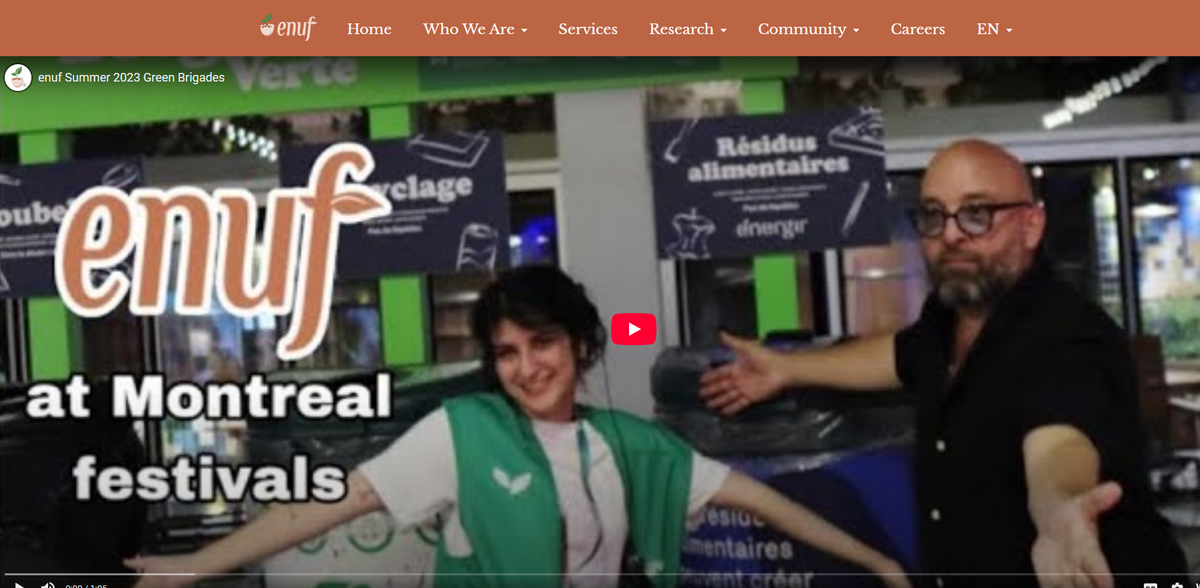About EnufCanada Project
EnufCanada (https://enufcanada.ca) is a B-Corp social enterprise that helps organizations tackle the waste crisis. This dynamic project is all about empowering organizations to do good in ways that are hassle-free, engaging, and cost-effective. Designed with environmental impact in mind, EnufCanada operates in the other education industry, offering services that not only support waste reduction and waste sorting but also foster waste education. With a notable B-Corp score of 83.5, the project stands as a beacon for initiatives that combine efficiency and sustainability, making a significant difference in the community while keeping an eye on environmental responsibility…
The Main Benefit: Innovative Waste Solutions
The project offers several key benefits that contribute to improved waste management and environmental conservation. Below is a list of figures and facts that capture the essence of the initiative:
- B-Corp Social Enterprise status: Ensures commitment to social and environmental performance.
- Comprehensive Waste Audits: General audits alongside specialized reports for certifications like BOMA BEST and LEED.
- Emphasis on Data-Driven Recommendations: Quantifies overall waste composition, contamination rates, and capture rates.
- Cost-Effective Composting: Provides cheaper-than-landfill waste management services through organic waste collection.
- Community Engagement: Celebrates progress regularly via the website and social media while involving community members and students.
Waste Audits and Data-Driven Recommendations
The waste audits are at the core of what EnufCanada is offering. The team conducts general audits as well as specialized reports that are essential for attaining industry certifications such as BOMA BEST and LEED. By quantifying overall waste composition, the project identifies the biggest sources of waste which can then be targeted for reduction and diversion efforts. With measured approaches to quantifying contamination rates—like assessing how much unrecyclable material is mixed in the recycling bin—and determining capture rates (for instance, understanding how much recyclable paper is correctly sorted), this project provides hands-on data-driven recommendations that are practical and effective. It’s a detailed yet easy-to-follow system that makes understanding waste management simple and straightforward…
Expert Composting Services
Alongside offering robust waste audits, the initiative extends its services through expert composting programs. By collecting organic waste and transporting it to partner local organic facilities, the project is not only helping reduce landfill dependency but is also educating communities about sustainable waste management practices. The composting service is cheaper than landfill alternatives, and it demonstrates that environmentally friendly practices do not always come with a high price tag. This approach to composting reinforces the essential concept that waste can be transformed into a valuable resource, all while supporting local environmental efforts and promoting skills in composting education.
Green Brigades: Community Impact in Action
Green Brigades are an integral part of the EnufCanada offering. These teams stand next to waste stations, providing on-the-spot tutorials and helping event attendees learn how to sort their waste correctly. With quick five-minute sessions that cover the basics of waste sorting, the Green Brigades bring education directly into the community in a casual yet effective manner. They also assist in collecting untouched surplus food from various events, redirecting it to community fridges located on student campuses across Montreal. These actions not only facilitate immediate waste reduction but also empower students and community members through opportunities for learning and employment. The initiative, with its casual and engaging language, makes waste education accessible and relatable, transforming everyday actions into significant environmental contributions.
Community and Environmental Stewardship
The project’s approach to environmental stewardship extends far beyond simple waste collection and sorting. It actively engages community members and students by hiring them for on-ground waste management roles, thereby building a knowledgeable and passionate workforce. Through regular updates via its website and lively social media presence, the initiative strengthens community ties and builds credibility. Little by little, the project brings about behavioral shifts in how waste is handled, ensuring that waste reduction and proper sorting become part of everyday life. Such strategies create a ripple effect that not only benefits the environment but also fosters a culture of mindful living, where each action taken resonates with longer-term ecological benefits…
Project Impact and SDGs Link
- SDG 11: Sustainable Cities and Communities – Through waste audits and waste management services.
- SDG 12: Responsible Consumption and Production – By promoting waste reduction, composting, and recycling.
- SDG 13: Climate Action – Through practices that lower waste contribution to landfill emissions.
- SDG 4: Quality Education – By delivering waste education and composting education through community engagement.
Waste Education and Environmental Empowerment
The focus on waste education is one of the most powerful aspects of the EnufCanada project. By intertwining practical waste management with educational outreach, the initiative helps bridge the gap between environmental awareness and effective action. Organizations and communities are encouraged to adopt innovative waste sorting and reduction strategies that not only conserve resources but also provide a blueprint for future environmental projects. This real-world approach to problem-solving, which is both casual and engaging, contributes significantly to the broader environmental conversation. The project’s blend of rigorous audits, expert composting services, and immersive community engagement creates a highly influential model—one that can be rendered into other contexts where environmental and waste education is a priority. Ultimately, the project is a testament to the impactful potential when education merges seamlessly with sustainable practice, thus fostering a healthier environment for everyone.


















